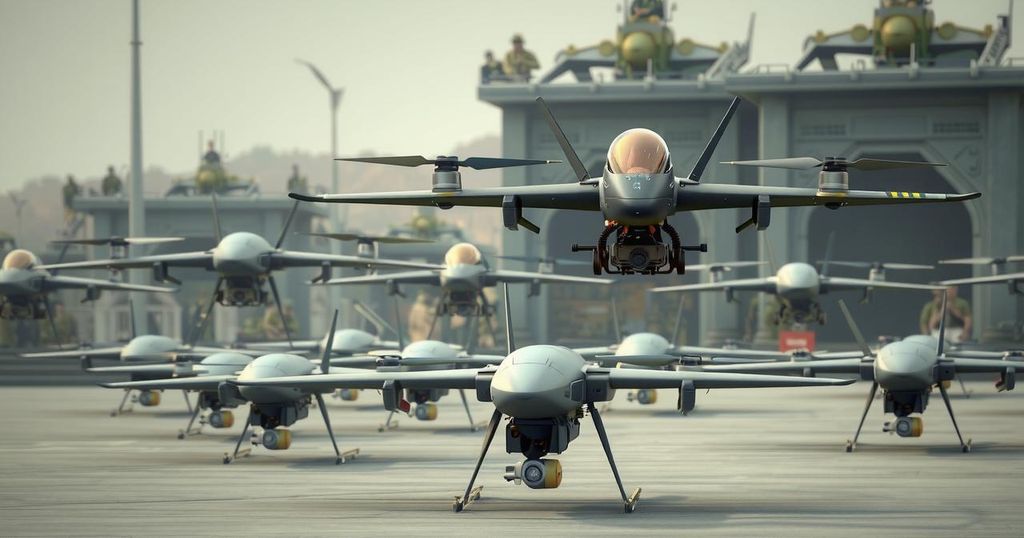North Korea Enhances Military Cooperation with Russia Amid New Drone Show
North Korea’s Kim Jong Un exhibited new military drones alongside reports of sending an additional 3,000 troops to Russia for the Ukraine conflict. This includes concerns about rising dependencies and exchanges of military resources between North Korea and Russia, as well as implications for future military strategies in the region.
North Korean leader Kim Jong Un showcased new military drones while reports indicated the deployment of an additional 3,000 troops to assist Russia in the ongoing Ukraine conflict. Images released by Pyongyang on March 27 depicted Kim inspecting reconnaissance and attack drones at an undisclosed location, amid increasing concerns that Russia may be supplying North Korea with drone technology in exchange for military support.
On the same day, South Korea’s Yonhap news agency reported from the Joint Chiefs of Staff (JCS) in Seoul that approximately 3,000 North Korean troops had been dispatched to Russia during January and February. This follows a previous contingent of 11,000 troops already deployed to assist in Russia’s Kursk region. According to Ukrainian analyst Oleh Saakyan, “we can say that Russia is already becoming dependent on North Korea in many ways, not only in terms of shells, but also in terms of other weapons…as well as in terms of soldiers,” highlighting the evolving military cooperation between the two nations.
The troop deployments, first reported in late February, coincide with Russia’s statement about plans for Kim to visit Moscow later this year. Kim has a history of visiting Russia, engaging with President Vladimir Putin since 2019, alongside multiple meetings with Chinese leaders and summits with former U.S. President Donald Trump.
Relations between Moscow and Pyongyang have strengthened significantly since Russia’s invasion of Ukraine in 2022. In addition to sending troops, North Korea has provided short-range missiles, self-propelled howitzers, and rocket launchers, according to South Korean military reports. Saakyan noted the difficulty of the Russian economy and mobilization efforts, stating, “in reality, the state of the Russian economy and Russia’s mobilization needs are becoming more and more difficult to meet, just like in Ukraine.”
Furthermore, the JCS assessed that the recent troop deployment brought additional equipment and ammunition. Russia has been demanding a cessation of military aid to Ukraine as a prerequisite for a partial cease-fire. Last month, Kim expressed North Korea’s commitment to support Russia as part of a “comprehensive strategic partnership.”
The deployment began in autumn 2022 but initially faced challenges, with reports of significant casualties among North Korean troops due to Ukrainian drone attacks. By late January, some North Korean forces were reported to have retreated from the front lines amid these losses. However, a recent improvement in their performance has led to their involvement in recent battles in the Kursk region, raising concerns in South Korea over the experience gained by North Korean forces and the potential transfer of technology from Russia.
On March 27, North Korean state media reported Kim’s satisfaction with the new drones, linking their production increase to a focus on drones and artificial intelligence. South Korean military spokesman Lee Sung Joon commented on the showcased drones, suggesting that while they may use Russian components, their capabilities might be overstated, stating, “it looks quite cumbersome and we assess that it’s likely vulnerable to interception.”
In summary, North Korea is intensifying military collaboration with Russia, recently showcasing new drones while sending additional troops to assist in the Ukraine conflict. This highlights a deepening dependence of Russia on North Korean support, both in terms of personnel and weaponry. Recent developments indicate a warming of relations, with increased troop deployments and technology exchanges likely to impact the ongoing military dynamics in the region. Furthermore, concerns over the effectiveness and modernization of North Korean forces continue to rise.
Original Source: www.rferl.org




Post Comment